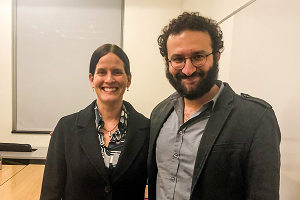Communications
PhD Graduate’s New Framework Exposes Information Control Struggles in the Digital Era

At AU’s School of Communication, PhD students are creating new knowledge at the intersection of media, democracy and technology.
Aras Coskuntuncel, PhD
“Networking Authoritarian Neoliberalism: Realigned Strategies of Information Control and Resistance in the Case of Turkey”
As the Turkish government and its supporters solidify power and suppress dissent in the country, the ability of protesters and journalists to organize and share information over digital platforms is more important than ever. Watching events unfold, observers view webcasts and read tweets and assume that new digital communication technology keeps information flowing freely. The work of recent PhD graduate Aras Coskuntuncel helps us understand that, in real life, the story is not so simple.
Coskuntuncel’s research challenges the prevailing narrative that digital communication technologies tend to favor free speech and democratic processes, and he offers a new framework for understanding how non-democratic actors use “control points” to censor and limit the flow of information.
Using Turkey as a case study, Coskuntuncel explored the struggle between competing groups to control information during moments of social upheaval. He found that while dissidents and journalists used digital platforms to try to resist censorship, ruling elites were deploying the same technologies to censor and limit the flow of information. Far from undermining traditional structures, new technology may have helped those elites perpetuate their hold on power.
The new PhD graduate also contributes a unique analytical framework for understanding these dynamics. The framework comprises five “information control points” critical to manipulating the flow of information:
- Instrumentalizing media through ownership structure
- Privatizing censorship and surveillance by taking advantage of the businessmodel of the digital media
- Networking surveillance
- Employing direct censorship and legal political attacks
- Networking information campaigns
The framework provides a powerful tool for researchers and democracy advocates looking to better understand the mechanisms of control in the digital era. Coskuntuncel hopes it will also help people “envision more democratic alternatives to today’s communication systems.”
Prior to entering the SOC PhD program, Coskuntuncel earned his master’s degree in media studies from the University of Wisconsin-Milwaukee. While living in Turkey, he worked for the Hurriyet Daily News in Istanbul as the diplomacy and foreign news editor. Those experiences left him well prepared to launch an ambitious PhD project.
Coskuntuncel attributes the success of his dissertation, in part, to the scholarship and mentorship of AU SOC faculty. He says, “Our faculty’s approach, expertise, and their tireless guidance and close attention are what make AU’s PhD in communication second to none.” He points to the many professors who provided assistance and mentorship, including his adviser and dissertation committee chair, Laura DeNardis, Professor Emerita Kathryn Montgomery, PhD Program Director Patricia Aufderheide, Chair of Communication Studies Division Aram Sinnreich, and Professor Ericka Menchen-Trevino.
The School of Communication is proud to share the work of PhD graduates, like Coskuntuncel, whose work expands the boundaries of human knowledge and has real-world impact. Learn more about the PhD program in communication studies, here.